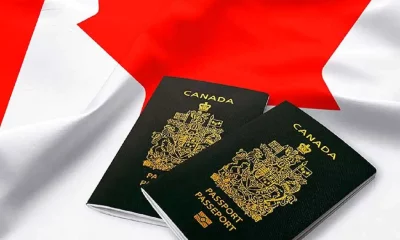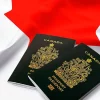Career
How to Get Travel Loans and Grants to Relocate to UK Easily
Relocating to the UK can be a life-changing experience, but it often requires a significant financial investment. Fortunately, various options are available to help cover the costs, including travel loans and grants.
Programs That Award Travel Loans and Grants to Individuals Relocating to the UK
Facilitating the transition of individuals and families moving to the UK through travel loans and grants can significantly ease their adjustment to a new environment. Various programs are available to assist those wishing to relocate to Britain. Here are six programs we know about:
1. Government Assistance Programs
The British government has launched several initiatives aimed at newcomers to the nation. One notable example is the New Enterprise Allowance (NEA) scheme, which provides mentorship and financial support to individuals looking to start their own businesses. While not specifically designed as a travel loan program, the funds provided by NEA can indirectly help with relocation costs by financing business initiatives, thus reducing the financial burden of settling down in Britain.
2. Global Talent Visa
The Global Talent Visa, previously known as Tier 1 (Exceptional Talent), is designed to attract highly skilled migrant workers to the UK. Approved applicants receive endorsements in various fields such as sciences, engineering, humanities, digital technology, arts, and culture. Although the visa itself does not directly provide travel loans or grants, obtaining this visa can lead to job opportunities or funding within the UK, thereby indirectly easing migration costs.
3. British Council Grants
The British Council offers a variety of scholarships and grants for international students, researchers, artists, and professionals. These grants cover different areas of study and often include travel allowances to assist with moving to the UK. Examples include the Chevening Scholarships for postgraduate studies, Commonwealth Scholarships for students from Commonwealth countries, and the Artist International Development Fund aimed at fostering cultural exchange.
4. Charity Organizations
Numerous charitable organizations in the UK provide financial support to individuals and families relocating to the country. Organizations such as the British Red Cross Society, Refugee Council, and Shelter offer resettlement assistance in the form of grants, loans, or practical support, including covering travel costs, housing services, and essential living expenses.
5. Employer Relocation Packages
Many UK-based companies offer relocation packages to attract and retain talent from around the world. These packages may cover airfare, temporary accommodation, shipping costs for personal belongings, and other moving expenses. The specifics of these packages can vary depending on the company and the nature of the employment, but they can significantly ease the financial burden of relocating to the UK.
6. Educational Institutions
UK educational institutions often provide financial assistance to international students, which can include travel grants and scholarships. This support helps students cover the costs of relocating and settling into their new academic environment. Financial aid from universities can enable students to access quality education, healthcare, and cultural experiences, enhancing their overall quality of life.
How to Get Travel Loans and Grants To Relocate to UK Easily
Here’s a step-by-step guide on how to apply for these financial aids effectively.
1. Understand Your Financial Needs
Before applying for a loan or grant, assess your financial situation. Calculate the total cost of your relocation, including travel expenses, visa fees, initial accommodation, and other living costs. This will help you determine how much money you need to borrow or secure through a grant.
2. Research Available Loans and Grants
Once you have a clear understanding of your financial needs, the next step is to research the various loans and grants available to help finance your relocation to the UK. This involves looking into different types of financial aid, understanding the terms and conditions, and identifying the ones that best suit your circumstances. Here’s how to approach this step:
Exploring Travel Loans
Travel loans can be a practical solution for covering relocation expenses. Here are the main types of travel loans you can consider:
1. Personal Loans: Personal loans are a common option for financing relocation. Many banks and credit unions offer these loans, which can be used for any purpose, including travel and relocation. When considering a personal loan, it’s essential to compare interest rates, repayment terms, and eligibility criteria from different lenders. Personal loans often come with fixed interest rates and predictable monthly payments, making it easier to budget for repayment.
2. Specialized Travel Loans: Some financial institutions offer loans specifically designed for travel and relocation purposes. These loans may have more favorable terms, such as lower interest rates or extended repayment periods, tailored to individuals who need to finance a move. It’s worth exploring these options to see if they provide better conditions compared to general personal loans.
Seeking Out Grants
Grants can be a valuable source of non-repayable funds, helping to reduce the financial burden of relocation. Unlike loans, grants do not need to be repaid, making them an attractive option if you qualify. Here are some potential sources of grants:
1. Government Grants: Many countries offer government grants for various purposes, including international relocation. Check with your home country’s government agencies to see if there are any grants available for citizens moving abroad. These grants may be aimed at supporting education, employment, or other specific relocation needs.
2. International Scholarships: If you are relocating to the UK for educational purposes, such as pursuing a degree, research scholarships offered by UK universities and international organizations. Scholarships can cover tuition fees, living expenses, and travel costs. Look into programs like Chevening Scholarships, Commonwealth Scholarships, and university-specific awards that support international students.
3. NGOs and Foundations: Non-governmental organizations (NGOs) and foundations sometimes offer grants for individuals relocating for specific reasons, such as work in humanitarian fields or scientific research. Organizations like the Rotary Foundation and the Fulbright Program provide grants for various professional and academic endeavours. Research these opportunities to find grants that align with your relocation purpose.
Note: Each loan and grant program will have specific eligibility criteria and application requirements. Carefully review these to ensure you qualify before applying.
Evaluating Eligibility and Requirements
Each loan and grant program will have specific eligibility criteria and application requirements. Carefully review these to ensure you qualify before applying. Common criteria might include:
– Credit Score: Lenders often assess your creditworthiness based on your credit score. Ensure your credit report is accurate and address any issues beforehand.
– Proof of Income: Provide documentation of your current income, such as salary slips, bank statements, or tax returns, to demonstrate your ability to repay a loan.
– Purpose of Funds: For grants, clearly articulate the purpose of your relocation and how the funds will be used. This could include providing admission letters from educational institutions or employment offers from UK employers.
– Application Deadlines: Grants often have specific application periods. Make sure to submit your application within the designated timeframe to be considered.
Comparing and Selecting the Best Options
After identifying potential loans and grants, compare their terms, benefits, and obligations. For loans, consider factors such as interest rates, repayment schedules, and any associated fees. For grants, assess the amount of funding available, the application process, and the likelihood of approval based on your qualifications.
Seeking Professional Guidance
If the process seems overwhelming, consider seeking help from financial advisors or relocation experts. They can provide insights into the best financial products for your needs and assist with the application process. Additionally, many universities and large employers have dedicated offices to help international students and employees navigate financial aid options.
3. Prepare Necessary Documentation
For both loans and grants, you’ll need to gather various documents. These might include:
– Identification Proof: Passport or national ID card.
– Proof of Income: Salary slips, bank statements, or tax returns.
– Relocation Plan: A detailed plan explaining why you need the funds and how you intend to use them.
– Proof of Admission/Employment: If applicable, provide proof of admission to a UK institution or an employment offer.
– References: Letters of recommendation or references might be required for grant applications.
4. Apply for Travel Loans
1. Choose a Lender: Select a bank or financial institution that offers the best terms for your needs.
2. Submit Application: Fill out the application form and submit it along with the required documents.
3. Credit Check: Be prepared for the lender to conduct a credit check to assess your creditworthiness.
4. Approval and Disbursement: If approved, review the loan agreement carefully before signing. The funds will be disbursed to your account.
5. Apply for Grants
– Find Suitable Grants: Look for grants that match your profile and relocation purpose.
– Write a Strong Application: Clearly explain your reasons for relocation, how the grant will help you, and what you plan to achieve.
– Submit Application: Submit the completed application along with supporting documents before the deadline.
– Follow Up: After submission, follow up with the grant provider to check the status of your application.
6. Plan Your Move
Once you secure the necessary funds, start planning your move. Book your flight, arrange accommodation, and ensure all your paperwork (visa, passport, etc.) is in order.
Tips for a Successful Application
– Start Early: Begin your research and application process well in advance of your planned relocation date.
– Be Honest and Detailed: Provide accurate information and detailed plans in your applications.
– Seek Professional Help: If needed, consult financial advisors or relocation experts to guide you through the process.
– Stay Organized: Keep track of all applications, deadlines, and correspondence.
Conclusion
Relocating to the UK can be financially demanding, but with careful planning and the right resources, it is possible to secure the necessary funds through travel loans and grants. By following these steps, you can increase your chances of a successful application and make your move to the UK a reality.















